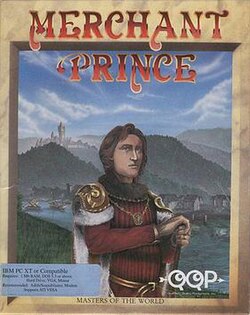Merchant Prince
| Merchant Prince | |
|---|---|

Cover art
|
|
| Developer(s) | HDI |
| Publisher(s) | QQP |
| Platform(s) | MS-DOS |
| Release | 1993 |
| Genre(s) | Turn-based strategy |
| Mode(s) | Single-player, Multiplayer |
| Machiavelli the Prince | |
|---|---|

Cover art from the black box
|
|
| Developer(s) | HDI |
| Publisher(s) | Microprose |
| Platform(s) | MS-DOS |
| Release | 1995 |
| Genre(s) | Turn-based strategy |
| Mode(s) | Single-player, Multiplayer |
| Merchant Prince II | |
|---|---|

Cover art
|
|
| Developer(s) | HDI |
| Publisher(s) | Take-Two Interactive |
| Platform(s) | Windows |
| Release | 3 May 2001 |
| Genre(s) | Turn-based strategy |
| Mode(s) | Single-player, Multiplayer |
| Aggregate score | |
|---|---|
| Aggregator | Score |
| Metacritic | 57/100 |
| Review scores | |
| Publication | Score |
| 1UP.com | D- |
| CGW | 1.5/5 |
| GameSpy | 75/100 |
| IGN | 7.3/10 (US) |
Merchant Prince is a turn-based 4X strategy video game franchise set the Republic of Venice during the Renaissance. The first Merchant Prince was published in 1993; Machiavelli the Prince in 1995; and Merchant Prince II in 2001. All three were developed by Holistic Design (HDI) but had separate publishers. The first two use MS-DOS; the third Windows. All three support up to four players and differ chiefly in their graphics and user interface.
In general, the games are trade simulators where items are bought low, transported, and sold high. They achieved notability, however, for their representation of Venetian and papal politics, with players able to bribe senators and cardinals for political, military, and religious power. Overt attacks against other players can destroy one's popularity and influence, but the game offers a thieves' den where covert options include arson, rumor-mongering, and assassination. The games are won after a predetermined number of turns (years) by the player with the highest net worth, including the value of bribed senators and cardinals.
The game's world map has been praised as "capturing what exploring is really like", as the player expands beyond the known and certain world into distant seas and lands which have been filled in only by rumor, legend, and wild speculation.
The games begin with a letter from the player's wealthy uncle Niccolo announcing that he has died and left the majority of his estate to his daughters. He has left the player a yearly stipend of 100 florins (i.e., ducats), a map of the known world, at least one trading vessel, and some advice reminiscent of Machiavelli: "you must stick to the good so long as you can but if compelled by necessity you must be ready to use other means" and the "Golden Rule" that "he who has the gold makes the rules". The player's goal—over one lifetime or several—is to improve his family's standing.
...
Wikipedia
